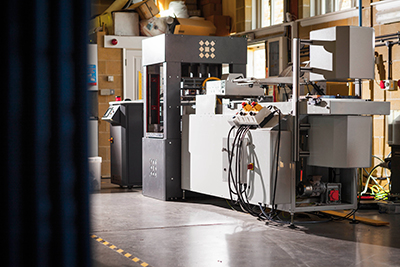Surface Generation, a provider of advanced carbon fibre processing technologies, is working with WMG, an academic department of the University of Warwick, and special materials provider AGC AeroComposites (AGC) to develop new composite press-forming processes for automotive and aerospace manufacturers.

Surface Generation is an advanced materials processing company based in the Midlands, United Kingdom. Its patented ‘Production to Functional Specifications’ (PtFS) process is used to combine, compact, process and meld plastic, glass and composite materials far more efficiently and with much greater precision than is possible using traditional injection and compression moulding processes. Surface Generation’s technologies are used by component providers and manufacturers across a range of industries, including aerospace, automotive, consumer electronics, defence and leisure.
Surface Generation’s PtFS process provides significantly greater regional control than traditional autoclave and oven curing. It also out-performs other methods across a range of temperature, cycle time and energy consumption metrics.
Looking for materials for your composite press-forming process?
Prospector has thousands of listings for plastics materials. Find technical data and request samples now!
Search Material Data
Uniquely in PtFS, the specification of the target component is used to precisely engineer the thermal, structural and control characteristics of its mould tool. Tools can be designed such that mould temperatures can be dynamically controlled to the exact requirements of individual regions or zones in a part and progressive stages of the forming and curing process. The tool is divided into multiple regions (typically >32) which are connected to a multi-channel control system. Variable, on-demand heated & cooled fluids circulating through each region allows individual zones to be independently managed throughout the entire cure. Pre-emptive control strategies programmed into the system ensure the final part meets its ultimate design intent.

Isolation and individual control of these regions enables manufacturers to continuously, and very rapidly, adapt each zone’s heating and cooling levels in real-time, optimising part quality and maximising throughput.
The company is developing new press-forming mould faces incorporating its patented PtFS technology for the production of high-performance thermoplastic composite components. By integrating Surface Generation’s active thermal management technologies into the mould face itself, WMG and AGC are able to continuously adapt heating and cooling levels for each mould area and process stage in real-time, with the expectation of improving both the quality and throughput of compression moulding.
The work is in support of the Composites Innovation Cluster’s Thermocomp project, which is seeking to develop short cycle time, high volume manufacturing processes that can be used by automotive and aerospace manufacturers for producing carbon fibre-reinforced thermoplastic components.
Ben Halford, Chief Executive at Surface Generation, comments: “PtFS provides automotive and aerospace manufacturers with a new level of sophistication in compression moulding. The ability to dynamically control the heat applied to each mould area throughout the cure cycle means manufacturers can quickly and cost-effectively upgrade existing production lines for thermoplastic composites and significantly reduce their cost of production. As part of an integrated production line PtFS makes it possible for manufacturers to achieve one minute Takt times for thermoplastic components.”
WMG was founded by Professor Lord Kumar Bhattacharyya in 1980 to help reinvigorate UK manufacturing. The Group has grown into an international role model for how universities and business can successfully work together, with Bhattacharyya continuing to lead as Chairman. WMG has over 500 people working across six buildings on the Warwick campus, plus collaborative centres in seven countries.
Geraint Williams, Project Manager at WMG, comments: “A major barrier to mainstream adoption of novel, aligned fibre-reinforced thermoplastics within the automotive sector is the difficulty of economically achieving short cycle times within a high volume production environment. Surface Generation’s PtFS technology has the potential to meet this challenge by eliminating process stages and enabling manufacturers to rapidly form composite components using a one-shot stamp-forming process.”
Dave Conway, Materials Technology Director at AGC AeroComposites, comments: “Traditional press forming processes are not economically viable for producing even medium volume parts of complex shape. By incorporating its revolutionary PtFS process into conventional press forming processes, Surface Generation has opened the door to a very exciting new era in aerospace manufacturing.”
Table 1 Characteristics of PtFS
- Reduce cycle times by 95%
- Reduce capital equipment and floor space by 85%
- Reduce energy consumption by 95%
- Rapid heating & cooling injection moulding cycle
- 200C min to 450C max, +/-0.5C tolerance
- Thermoplastic & thermoset
- Single sided, compression & RTM
- Real time intelligent process control
- 100% in-mould quality assurance
- Modular & reconfigurable
- Fibre placement, cure & repair
- Short run & mass production
- Prototyping
The views, opinions and technical analyses presented here are those of the author or advertiser, and are not necessarily those of ULProspector.com or UL Solutions. The appearance of this content in the UL Prospector Knowledge Center does not constitute an endorsement by UL Solutions or its affiliates.
All content is subject to copyright and may not be reproduced without prior authorization from UL Solutions or the content author.
The content has been made available for informational and educational purposes only. While the editors of this site may verify the accuracy of its content from time to time, we assume no responsibility for errors made by the author, editorial staff or any other contributor.
UL Solutions does not make any representations or warranties with respect to the accuracy, applicability, fitness or completeness of the content. UL Solutions does not warrant the performance, effectiveness or applicability of sites listed or linked to in any content.



Leave a Reply or Comment